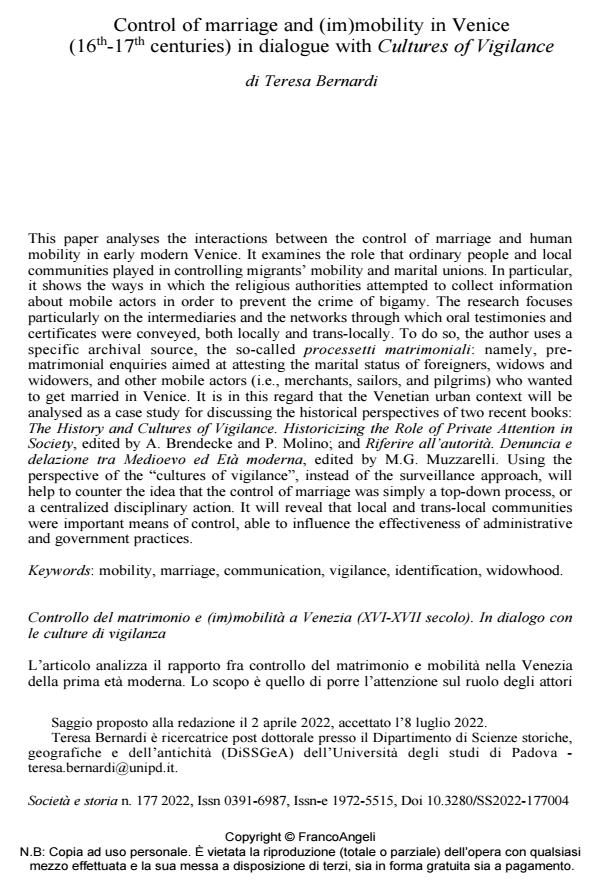Control of marriage and (im)mobility in Venice (16th-17th centuries) in dialogue with Cultures of Vigilance
Journal title SOCIETÀ E STORIA
Author/s Teresa Bernardi
Publishing Year 2022 Issue 2022/177
Language English Pages 23 P. 546-568 File size 274 KB
DOI 10.3280/SS2022-177006
DOI is like a bar code for intellectual property: to have more infomation
click here
Below, you can see the article first page
If you want to buy this article in PDF format, you can do it, following the instructions to buy download credits

FrancoAngeli is member of Publishers International Linking Association, Inc (PILA), a not-for-profit association which run the CrossRef service enabling links to and from online scholarly content.
This paper analyses the interactions between the control of marriage and human mobility in early modern Venice. It examines the role that ordinary people and local communities played in controlling migrants’ mobility and marital unions. In particular, it shows the ways in which the religious authorities attempted to collect information about mobile actors in order to prevent the crime of bigamy. The research focuses particularly on the intermediaries and the networks through which oral testimonies and certificates were conveyed, both locally and trans-locally. To do so, the author uses a specific archival source, the so-called processetti matrimoniali: namely, pre-matrimonial enquiries aimed at attesting the marital status of foreigners, widows and widowers, and other mobile actors (i.e., merchants, sailors, and pilgrims) who wanted to get married in Venice. It is in this regard that the Venetian urban context will be analysed as a case study for discussing the historical perspectives of two recent books: The History and Cultures of Vigilance. Historicizing the Role of Private Attention in Society, edited by A. Brendecke and P. Molino; and Riferire all’autorità. Denuncia e delazione tra Medioevo ed Età moderna, edited by M.G. Muzzarelli. Using the perspective of the "cultures of vigilance", instead of the surveillance approach, will help to counter the idea that the control of marriage was simply a top-down process, or a centralized disciplinary action. It will reveal that local and trans-local communities were important means of control, able to influence the effectiveness of administrative and government practices.
Keywords: mobility, marriage, communication, vigilance, identification, widowhood.
Teresa Bernardi, Control of marriage and (im)mobility in Venice (16th-17th centuries) in dialogue with Cultures of Vigilance in "SOCIETÀ E STORIA " 177/2022, pp 546-568, DOI: 10.3280/SS2022-177006